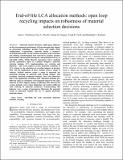| dc.contributor.author | Nicholson, Anna L. | |
| dc.contributor.author | Olivetti, Elsa A. | |
| dc.contributor.author | Gregory, Jeremy | |
| dc.contributor.author | Field, Frank R. | |
| dc.contributor.author | Kirchain, Randolph E., Jr. | |
| dc.date.accessioned | 2010-12-01T18:36:55Z | |
| dc.date.available | 2010-12-01T18:36:55Z | |
| dc.date.issued | 2009-07 | |
| dc.date.submitted | 2009-05 | |
| dc.identifier.isbn | 978-1-4244-4324-6 | |
| dc.identifier.isbn | INSPEC Accession Number: 10749793 | |
| dc.identifier.uri | http://hdl.handle.net/1721.1/60047 | |
| dc.description.abstract | Materials selection decisions exhibit great influence on the environmental performance of firms through their impact on processing technology, product form, and supply chain configuration. Consequently, materials dictate a product's environmental profile via the burden associated with extraction and refining, transformation from material to product, product performance characteristics during use, and potential recovery at end-of-life (EOL). While lifecycle assessment (LCA) methods provide quantitative input to a product designer's materials selection decision, LCA implementations are evolving and disparate. This work explores several analytical variations of LCA related to the allocation of recycling impacts at product EOL and the implications of these variants across a range of contexts. Stylized analyses across a range of materials are presented, focusing on materials with varying primary and secondary materials production burdens. This work illustrates that a) the application of distinct EOL allocation methods give different values of cumulative environmental impact for the same material, b) these impacts change at differing rates between the various methods, and c) these disparities can result in different rank ordering of materials preference. Characterizing this behavior over a range of parameters illustrates the potential trends in allocation method bias for or against particular materials classes. | en_US |
| dc.language.iso | en_US | |
| dc.publisher | Institute of Electrical and Electronics Engineers | en_US |
| dc.relation.isversionof | http://dx.doi.org/10.1109/ISSST.2009.5156769 | en_US |
| dc.rights | Article is made available in accordance with the publisher's policy and may be subject to US copyright law. Please refer to the publisher's site for terms of use. | en_US |
| dc.source | IEEE | en_US |
| dc.title | End-of-life LCA allocation methods: open loop recycling impacts on robustness of material selection decisions | en_US |
| dc.type | Article | en_US |
| dc.identifier.citation | Nicholson, A.L. et al. “End-of-life LCA allocation methods: Open loop recycling impacts on robustness of material selection decisions.” Sustainable Systems and Technology, 2009. ISSST '09. IEEE International Symposium on. 2009. 1-6. © Copyright 2009 IEEE | en_US |
| dc.contributor.department | Massachusetts Institute of Technology. Department of Mechanical Engineering | en_US |
| dc.contributor.department | Massachusetts Institute of Technology. Engineering Systems Division | en_US |
| dc.contributor.approver | Kirchain, Randolph E., Jr. | |
| dc.contributor.mitauthor | Nicholson, Anna L. | |
| dc.contributor.mitauthor | Olivetti, Elsa A. | |
| dc.contributor.mitauthor | Gregory, Jeremy | |
| dc.contributor.mitauthor | Field, Frank R. | |
| dc.contributor.mitauthor | Kirchain, Randolph E., Jr. | |
| dc.relation.journal | IEEE International Symposium on Sustainable Systems and Technology, 2009. ISSST '09. | en_US |
| dc.eprint.version | Final published version | en_US |
| dc.type.uri | http://purl.org/eprint/type/ConferencePaper | en_US |
| eprint.status | http://purl.org/eprint/status/PeerReviewed | en_US |
| dspace.orderedauthors | Nicholson, Anna L.; Olivetti, Elsa A.; Gregory, Jeremy R.; Field, Frank R.; Kirchain, Randolph E. | en |
| dc.identifier.orcid | https://orcid.org/0000-0003-2253-7768 | |
| dc.identifier.orcid | https://orcid.org/0000-0002-8043-2385 | |
| mit.license | PUBLISHER_POLICY | en_US |
| mit.metadata.status | Complete | |
